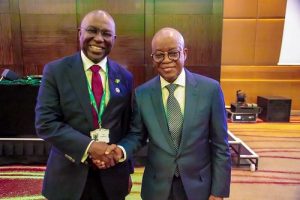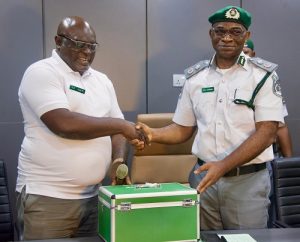NIMASA: Of New Cabotage Compliance Regime and Five-year Waiver Cessation
By Anthony Andem
It was John Sununu who said the constant need for special waiver was symptomatic of a poorly written public policy. It is a signal that the cost of compliance is unreasonably high, the benefits are hard to measure, and either legislators or regulators have failed to do their work.
The Nigerian maritime sector is a growing and developing sector, with promising opportunities. And administrators who must plot the affairs and future of this important sector are challenged to find and adopt strategies that are also promising because change is occurring at an accelerated rate in all sectors, all over the world. Yesterday is gone, today we are in, and tomorrow we do not know, thus, continuing today’s strategies and initiatives is risky, so is turning to new ones.
Therefore, moving along the change trend in the country and the maritime sector of the world economy, the Nigerian Maritime Administration and Safety Agency (NIMASA), under the leadership of Dr. Dakuku Peterside, has decided to review the country’s Cabotage Act in the overall interest of the nation. This is in line with Nigeria’s local content legislations and the vision that drove the introduction of the Nigerian Seafarers Development Programme (NSDP).
Within the context of the Cabotage Act is the framework, otherwise known as the four pillars, which are that: Cabotage vessels must be wholly-owned by Nigerians; they must be registered in Nigeria; must be crewed by Nigerians; and must be built in Nigeria. It was to facilitate these lofty ideals that concept of waivers was introduced, to cater for the maritime capacity deficiencies in Nigeria, but with Nigerian seafarers enjoying the right of first refusal.
Waivers, thus, became a routine practice by NIMASA to voluntarily and intentionally relax some legal advantages, claims, requirements or rights over foreign vessels carrying out Cabotage businesses within Nigeria’s territorial waters.
However, the regime had a caveat that demanded the engagement of Nigerian seafarers in all associated pillars of Cabotage with the aim of aiding the growth of the country’s maritime capacity, through placement of qualified Nigerian seafarers in the mandatory sea-time training with Cabotage vessels.
It was the hope that the Nigerian seafarers, upon engagement in the sea-time training with Cabotage vessels, would be equipped with the necessary maritime skills needed to bridge the gap of maritime capacity deficiencies within one year of their internship. With this, they could take over manning of such vessels. This was rarely achieved prior to the advent of Dakuku.
Dakuku, on assumption of office as Director General of NIMASA, inherited a number of initiatives, programmes and policies geared towards ensuring the growth and development of the sector through optimal harnessing of the country’s rich maritime resources. One of such initiatives was the Cabotage waiver regime.
Though waivers regime had its benefits, the fact remained that Nigeria and Nigerians were short-changed by foreigners who became the dominant force in the lucrative maritime space of Nigeria, particularly in the area of manning. This saw a large number of beneficiaries of the NIMASA NSDP and other sponsored maritime studies graduates struggling to have the mandatory sea-time training to qualify them as maritime professionals comparable with their international counterparts.
However, the leadership of NIMASA under Dakuku is changing the narrative. It is engaging in formulation of a number of policies with associated strategies for implementation, one of which is the recently announced “NIMASA Cabotage Compliance Strategy (NCCS)”. This is aimed at encouraging indigenous participation in shipping, particularly with regard to manning, which is the core of Cabotage waivers. It is instructive to reiterate that NCCS is not targeted at driving away foreigners, but to encourage full participation of Nigerians in the manning element of the Cabotage pillars.
According to the National Bureau of Statistics, “Youth Unemployment Rate in Nigeria increased to 25.20 per cent in the fourth quarter of 2016 from 25 per cent in the third quarter of 2016. Youth Unemployment Rate in Nigeria averaged 19.20 per cent from 2014 until 2016, reaching an all-time high of 25.20 per cent in the fourth quarter of 2016 and a record low of 11.70 per cent in the fourth quarter of 2014.”
The periods of these statistics fall within the Cabotage waiver regime, which means that contributions of the maritime sector also impacted unemployment in the country.
Therefore, NIMASA’s policy to temporarily suspend Cabotage waivers is purely in the national interest, as the country hopes for a huge multiplier effect. With this strategic posture, the scourge of unemployment would be drastically reduced because the jobs which were hitherto done by foreigners would be taken by Nigerians, hence complementing the Federal Government’s employment generation drive.
It is believed that with NCCS, along other government directives and programmes, like the Presidential Enabling Business Environment Council (PEBEC), Nigeria would see a number of interventions, such as port reforms, development of inland water transportation, and encouragement of indigenous involvement in maritime business. These would in turn create jobs and reduce unemployment in Nigeria.
As an agency of government charged with the responsibility of ensuring effective regulation of the Nigerian maritime space, it is expedient that this policy be put in place to better position Nigeria and the Agency, in particular, to achieve its vision and mission to enhance maritime capacity in line with the best global practices towards Nigeria’s economic development.
Manning is a core element or pillar of the Cabotage Act because every other pillar revolves around human resources. Without human input, building, flagging and ownership would be impossible. So sound policies on manning are needed for the country’s maritime breakthrough.
This may seem to be a herculean move, but from all indications, NIMASA, under the leadership of Dakuku, is committed and ready to ensure full enforcement of this new policy, notwithstanding the potential pressure and resistance the International Oil companies (IOCs), who were the major beneficiaries of the waiver regime, are likely to put.
The readiness of the Agency to ensure a holistic implementation of NCCS is evident in the intervention vessels, which NIMASA is prepared to commission as part of the measures put in place not only to fight piracy and other maritime crimes, but also to complement the implementation efforts of the new waiver regime and resistance management.
It would be recalled that NIMASA recently issued a marine notice of temporary suspension of the issuance of waivers on manning requirement under the Cabotage Act and mandated all Cabotage Officers to ensure strict compliance with the new directive. The aim of the NIMASA’s new waiver regime is to ensure a full takeover of the manning aspect of Cabotage vessels operating within the maritime territorial limit of Nigeria by qualified Nigerians who are currently not being given opportunities by foreigners.
This is a step in the right direction and marks a watershed in the history of the Agency. As Nigerians await the benefits of this new Cabotage regime, it is instructive to note that the cooperation of all stakeholders is needed to optimise the expected gains. On its part, NIMASA is poised to transform and position the nation’s maritime sector to be a major player in the world’s maritime community.
• Andem works in the PR Unit of NIMASA.





